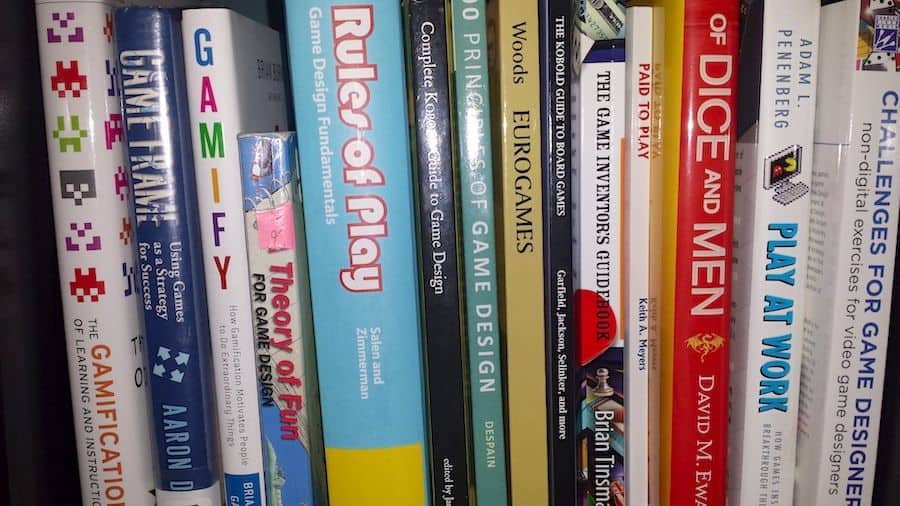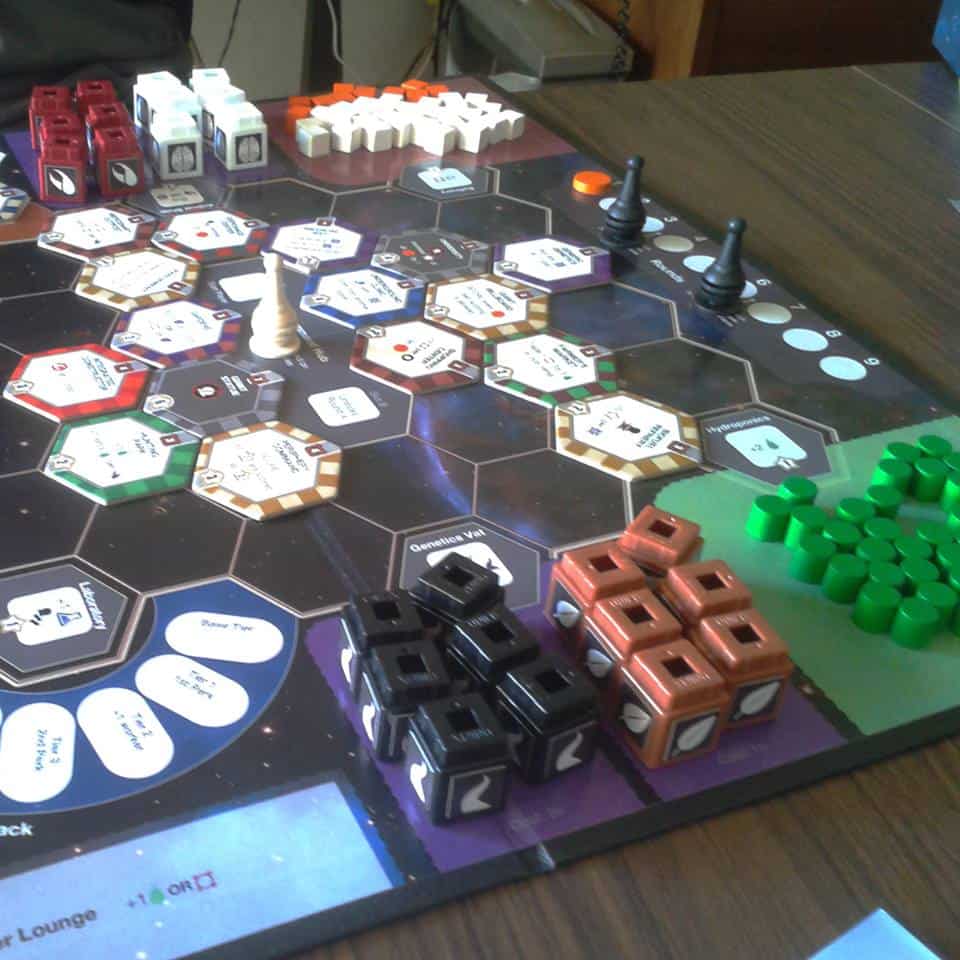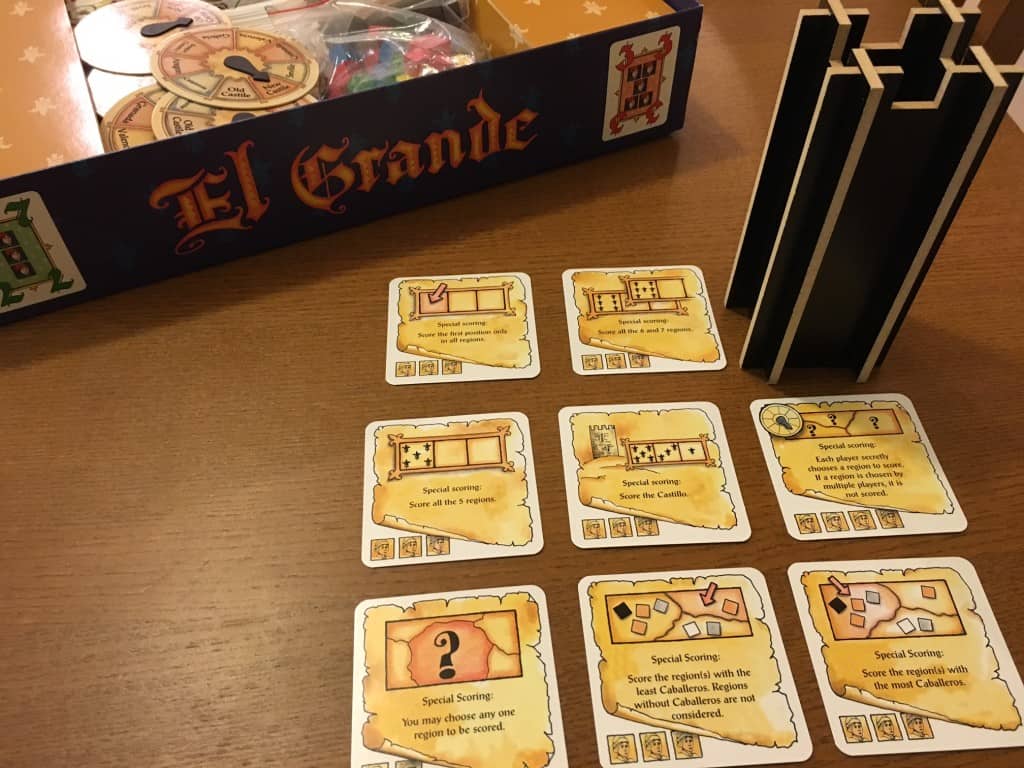
Guest Post by Pat Marino
Pat Marino is an independent game designer at Guilderland Games on a quest to be published. His current projects include Goblin Toboggan and Fabregé Chickens, the latter of which he is co-designing with his older brother Jim, who taught him to love games. When he is not designing games, Pat is busy working as a university administrator in San Diego, CA, and trying to incorporate gamification and game design into his PhD research on leadership theory.
Generally, when tabletop gamers refer to their shelves they are talking about the place where they store their game collections. However, there is another important shelf for designers to consider, and that is the bookshelf of resources used for design. In addition to a tool kit of meeples, dice, blank cards, paper cutters, punches, and various other bits, I have built up a modest collection of books that I have found rather useful in my development as a game designer and will share a few of the highlights here.
I am beginning work on a dissertation that will explore gamification in higher education (a blending of my career and passion for game design), so I have had a perfect excuse to do a fair amount of reading on game design theory, the game industry, and concepts of fun, engagement, and motivation. With that in mind, I recognize that some of the materials described below may be too abstract or too tangential to the main objective. Therefore, I’ve devided the list into two parts: The first list are the books that are the best introductory resources for tabletop game design. The second list are resources that are perhaps more obscure, but which I found useful in some capacity.

BOOKS ON TABLETOP GAME DESIGN
1. THE KOBOLD GUIDE TO BOARD GAME DESIGN
by Mike Selinker
When I first thought about the possibility of designing my own games this was the resource I used to open the floodgates. Mike Selinker serves as the primary author with a host of other greats including Steve Jackson, Richard Garfield, Andrew Looney, Matt Forbeck, James Ernest and Rob Daviau just to name a few. This book covers everything from concept to publication, and offers a set of guidelines for designing games that are worth considering. It is a light, fast read, and it is an essential starting point for anyone interested in getting published in the tabletop game industry; it certainly answered many of my questions before I even thought to ask them!
2. THE COMPLETE KOBOLD GUIDE TO GAME DESIGN
by Wolfgang Baur
This is a three-volume collection that offers a more in-depth companion to The Kobold Guide to Board Game Design – though this one has a focus on RPG development, instead of board games.
3. THE GAME INVENTOR’S GUIDEBOOK
by Brian Tinsman
This one is similar to the Kobold guide to board game design. Tinsman provides an introduction to the world of game design, playtesting, pitching and publishing. Much of this book reinforces the perspectives shared in the Kobold guide. A solid reference for anyone breaking into the industry, it can save you a lot of mistakes and headaches. As an added bonus there is a list of publishers (with addresses) and a list of brokers for those looking to work with the larger publishers like Hasbro.
4. PAID TO PLAY: THE BUSINESS OF GAME DESIGN
by Keith Meyers
Still another introductory guide to the industry. The content is similar to both the Kobold Guide to Board Game Design and The Game Inventor’s Guidebook. This time, told from the perspective of Keith Meyers, whose credits include working for The Game Keeper, Wizards of the Coast and Hasbro.
5. 100 PRINCIPLES OF GAME DESIGN
by Wendy Despain
As the title suggests, this book provides 100 one-page summaries of principles related to game design. Though the book tends to lean more towards video game design the concepts are universal and apply equally to tabletop design, which is referenced in several sections. The principles cover everything from game theory to motivation, fun and player engagement. Anytime I am stuck on a prototype, I find it helpful to flip through this book and consider how the principles relate to my design; it provides me with new ways of viewing my design and helps me move forward.
6. THE ART OF GAME DESIGN: A BOOK OF LENSES (AND A DECK OF LENSES)
by Jesse Schell
Similar to Despain’s list of 100 Principles, Schell provides a variety of lessons on the theory of game design. Unlike Despain’s book, Schell gets more technical. Select portions of the book apply directly to video and computer game design and may not be as useful for tabletop designers. However, for those wanting to dive deeper into the theory of game design it is a solid resource. As an added bonus, there is a less expensive version that comes in the form of a deck of cards covering the game design lenses. Drawing cards at random from the deck and considering their connection to your design process can serve as a game of its own.
7. A THEORY OF FUN FOR GAME DESIGN
by Raph Koster
It is not surprising to me that this book is referenced a lot in the game design literature. Koster focuses on what takes a game beyond a set of rules and mechanics and makes it fun for the players. About 90% of the time when I find a game is not firing on all cylinders the problem is that something is sucking the fun out of the experience. Having Koster’s words in the back of your mind can be a helpful remedy.
8. EUROGAMES: THE DESIGN, CULTURE AND PLAY OF MODERN EUROPEAN BOARD GAMES
by Stewart Woods
Woods is an academic by trade, and this book was born out of a thesis study. It is written in a more formal academic style than some of the other books on this list, but it is still very approachable. The book itself is not necessarily targeted at game designers and is not a guide to game design. Instead, it is an in depth look at the history of euro-style games, the industry, and their appeal. For those who believe that “to know where we are going it is important to know where we have been” Eurogames will speak your language.
9. RULES OF PLAY: GAME DESIGN FUNDAMENTALS
by Katie Salen and Eric Zimmerman
Rules of Play is a seminal resource on game design and certainly deserves a spot on this list. The caveat is that it is a textbook and comes with textbook length (over 600 pages) and cost. The theory is well researched and many of the other works I have read on game design and gamification cite this text as a primary resource. Not surprisingly, many college game design courses use this as their textbook of choice. Though I would not necessarily advise reading the book cover to cover, there is a wealth of valuable information and examples in this book that are worth exploring. The book is divided into four categories: core concepts, rules, play and culture. I also appreciate that each chapter offers recommended additional readings, which are helpful for expanding on the concepts you find most interesting.
ARCANA OBSCURA
The books in this next set have more of a fringe connection to tabletop game design and as a result I will keep the descriptions relatively brief.
10. GAME FRAME: USING GAMES AS A STRATEGY FOR SUCCESS
by Aaron Dignan
If you are interested in the concept of gamification – applying game thinking, mechanics and concepts to non-game environments – Game Frame is a great place to start. Dignan explains the base concepts and provides an easy to use model for gamifying everything from parenting to work place tasks.
11. THE GAMIFICATION OF LEARNING AND INSTRUCTION: GAME-BASED METHODS AND STRATEGIES FOR TRAINING AND EDUCATION
by Karl M. Kapp
Compared to Game Frame Kapp’s book is much more in depth, but also more technical to read. For those who work in education it is a great resource that will help you not only design gamified programs for education (or workplace training) it will provide you with the research based theory to justify the use of gaming with colleagues or supervisors who may be skeptical.
12. GAMIFY: HOW GAMIFICATION MOTIVATES PEOPLE TO DO EXTRAORDINARY THINGS
by Brian Burke
This book explores gamification in work environments, and specifically looks at how gamification motivates people.
13. WHY PEOPLE PLAY
by Michael J. Ellis
As the title suggests, this book looks at what play is from a psychological perspective and why we are drawn to engage in play behavior. It begins with classic theories and moves to more recent theory and how the theories are applied in practice.
14. HOMO LUDENS: A STUDY OF THE PLAY-ELEMENT IN CULTURE
by Johan Huizinga
Similar to Why People Play, Homo Ludens (the playing man) is a classic study on the persistent role of play in human culture.
Have you read any of these books? Which ones would you recommend? Are there other books or resources that have shaped your thoughts on game making? Post in the comments below.








